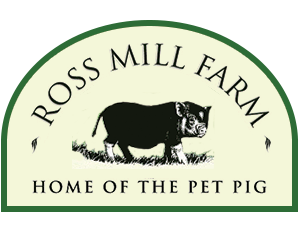The following is written by Dr John Carr, an esteemed veterinarian specializing in pigs.
Coronaviruses, COVID-19 and Our Pigs
Pigs cannot get COVID-19 and will not give you COVID-19.
To date there is no evidence of any animal transmission with this new coronavirus COVID-19. This is a human virus and a human problem. The evidence is pointing to a person in Wuhan becoming the first case in November 2019. There has been a report of the virus being found in a dog in Hong Kong but the virus was found but was not replicating and the virus died out in the dog without producing any clinical signs.
There has been no cases, zero, of pigs getting COVID-19 in China.
Coronaviruses are a very big family of similar viruses. They are so called because down the electron microscope they look like the corona of the sun. This virus family is thousands of years old. The corona is formed from a variety of spikes that stick through the oily envelope.

The virus family lives in many many species of mammal, birds, and other reptiles.
Man has many known Coronaviruses – the many human coronavirus already known about before 2019 are responsible for 15% of the common cold cases. But we also know of several types, which are very serious these are Severe Acute Respiratory Syndrome (SARS) and Middle East Respiratory Syndrome (MERS). They are a difficult family to control and vaccination generally produces poor protection. Their genetics are based on RNA and this means they can easily change. Which makes them vary difficult to control as new forms will constantly emerge and the animal (and our) population will have little or no immunity to the ‘new’ form. This is what happened at the end of 2019. A new form of this virus appeared and is now going worldwide.
Our pigs can get their own Coronaviruses which have a range of clinical problems – Porcine Epidemic Diarrhoea (PED) affects piglets less than 10 days of age intestines with fatal consequences and Porcine Respiratory Coronavirus (PRC) affects pigs breathing causing a mild cough and sneeze similar to our seasonal colds which can be dramatic but the pigs all recover. But these viruses do not infect people.
The change in PED to a more virulent form occurred following the interaction of the pig coronavirus with a Bat coronavirus. A similar history to what has happened in man with COVID-19.
These Coronaviruses do have a weakness – they have a layer of fat on the outside of the virus and if this is removed the virus cannot function. For this reason washing your hands carefully with soap and water for at least 20 seconds, ideally with a nailbrush is a great idea.
Washing your hands to remove viruses can be difficult as illustrated using a UV soap, which we use on our students to teach them good hand bio-security.

Lets go through some of the signs of this particular COVID-19 major clinical signs
| Clinical signs | Common cold | Influenza | COVID-19 |
| Fever | Uncommon | Common | Common |
| Fatigue | Sometimes | Common | Common |
| Cough | Common | Common | Common |
| Aches and pains | Common | Common | Sometimes |
| Sore throat | Common | Sometimes | Sometimes |
| Headaches | Uncommon | Common | Sometimes |
| Shortness of breath | No | No | Sometimes |
| Runny nose | Common | Sometimes | Uncommon |
| Diarrhoea | No | Sometimes | Uncommon |
| Sneezing | Common | No | No |
This is only an outline if you are concerned you must consult with a medical professional.
The major signs are fever, fatigue and coughing. Sneezing and a runny nose are not signs of this COVID-19 disease.
Age groups affected
Majority of flu and colds appear to be more serious for the very young and old.
COVID-19 is different it really affects older people. In pigs with PED we have something similar but the other way round where pigs less than 10 days of age get very sick but older than this the clinical signs are relatively mild.
One of the facts might be that at birth we are gifted with natural immunity to pathogens. The body takes 14 days or so to create antibodies but these only protect us when we are infected a Second time – not the first. As we get older the innate (natural) defense mechanisms of the body becomes weaker and we rely on our memory (antibodies) to protect the body. With this virus nobody has any memory because it is new. Once the first wave had passed this virus is likely to become part of our seasonal cold we are all used to. But this first passage is a painful lesson we are all human and in this together.
_________________
Dr. John Carr, BVSc, PhD, DPM, DiplECPHM, MRCVS
John started learning the ropes about pigs at the age of 11 . He qualified as a veterinarian in 1982. After 5 years in general practice he returned to university to complete a Leverhulme residency in pigs and the PhD in urinary tract problems of pigs at Liverpool specializing in microbiology and pathology. He has taught production medicine to veterinarians and farmers throughout the world through positions at several universities: UK; Liverpool and Royal Veterinary College, London, US; North Carolina and Iowa State and in Western Australia at Murdoch. John runs a consultancy practice with clients in North America, Europe, Asia, Australia and Africa. John specializes in maintaining the health of pigs through promoting excellence in stockmanship and production practices while controlling the cost of production.


